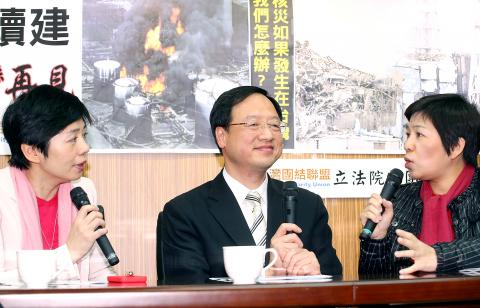|
Nuclear Power Debate:
KMT pushes for absentee voting bill
NEW ISSUE: A draft bill on absentee voting can
be finalized speedily if party caucuses reach consensus, the legislative speaker
said, otherwise it could delay the referendum
By Shih Hsiu-chuan and Mo Yan-chih / Staff reporters

Premier Jiang Yi-huah, center,
exchanges opinions on the nuclear issue with Taiwan Solidarity Union (TSU)
legislators Lin Shih-chia, left, and Huang Wen-ling on a visit to the TSU party
caucus yesterday.
Photo: CNA
Chinese Nationalist Party (KMT)
legislative caucus whip Lai Shyh-bao (賴士葆) yesterday said his party planned to
submit a draft of an absentee voting bill in two weeks’ time and wished to push
it through the legislature by May.
The bill is being drafted by KMT Legislator Ting Shou-chung (丁守中).
Ting said he would suggest that voters be allowed to vote by absentee ballots in
various ways in presidential and vice presidential elections, as well as in
national referendums.
There are various types of absentee voting, under which voters can vote in
person in early voting, access an absentee ballot online, vote by mail or vote
where they work or study rather than at their polling places, while dedicated
polling stations will be open on polling day for prisoners or elderly voters in
care centers, Ting said.
Ting said he would include all the types of absentee voting in his proposed
draft, but a decision on which types to pursue is for all lawmakers to make.
The Democratic Progressive Party (DPP) has said that absentee ballots should be
granted to eligible voters in the country and not be extended to Taiwanese
living overseas.
In response to the DPP, Ting said the issue “should not be politically
calculated.”
“Not all [China-based] Taiwanese businesspeople are KMT supporters,” he said.
Lai said that the party was willing to address the concerns of the DPP in
deliberating the legislation.
“We can in the initial stage restrict applications for absentee voting to voters
residing in Taiwan and extend the system to overseas citizens later on,” Lai
said.
Meanwhile, Legislative Speaker Wang Jin-pyng (王金平) yesterday said there is a
global trend toward allowing absentee voting in major elections and that the
legislative branch would hold cross-party negotiations on the issue and seek
consensus to complete the legislation process of the absentee voting system.
“We should promote absentee voting because it is a global trend … Legislating
the absentee voting system will be speedy, if party caucuses reached a consensus
on the issue,” he said.
If the party caucuses have different opinions on whether absentee voting should
be included in a referendum on nuclear power, the legislation process could take
longer and delay the referendum, he said.
New Taipei City (新北市) Mayor Eric Chu (朱立倫), who on Monday proposed that the
absentee voting system be adopted for the nuclear referendum, expressed
confidence in the Legislative Yuan’s efficiency to facilitate the legislation
process.
He brushed aside speculation that he raised the proposal to steal the spotlight
from Premier Jiang Yi-huah (江宜樺), a rising political star in the KMT, and said
both President Ma Ying-jeou (馬英九) and Jiang were in agreement with him that
issues related to the power plant should be determined by the public.
“The referendum on the Fourth Nuclear Power Plant and an absentee voting system
are issues that aim to solve disputes over the power plant. We all want to make
the referendum a success and allow the public to have their say via the
referendum,” he said.
According to Minister of the Interior Lee Hong-yuan (李鴻源), the date for the
referendum on whether to complete the Fourth Nuclear Power Plant may be
postponed if absentee voting is to be applied.
“To apply absentee voting [in the referendum], we need to either amend the
Election and Recall Act for Public Servants (公職人員選舉罷免法), amend the Referendum
Act (公民投票法) or create special legislation for absentee voting in a referendum,”
Lee said.
“It would go fast if we can have the law revisions done by this legislative
session — which ends in May or June — and then we need another six months to
prepare for the referendum, so it’s more likely that the referendum would be
held by the end of the year at the earliest,” he added.
He added that his ministry would discuss details of the matter with the
Executive Yuan and do its best to accomplish the mission.
Additional reporting by Loa Iok-sin
|
![]()
![]()
![]()